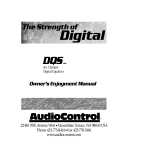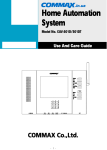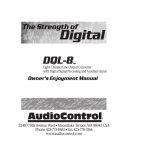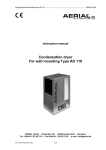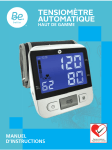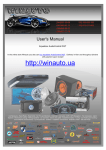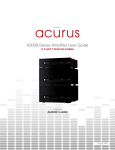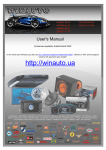Download Audio Control LC7i Service manual
Transcript
LC7™ Six Channel Line Output Converter With Auxiliary Input For interfacing with factory installed audio systems G reetings from the rainforests of the Pacific Northwest. We would like to congratulate you on your purchase of the LC7, a six-channel, high-performance, line-output converter with an auxiliary input. This nifty product will accept two, four, or six channels of speaker-level signal from a factory-installed amplifier or source unit and convert it to a highquality, low-noise pre-amp signal. This makes the LC7 an ideal OEM (Original Equipment Manufacturer) interface component as it will allow you to use your factory-installed source unit but give you the ability to add really good aftermarket amplifier(s) and processor(s). The LC7 also has an extra set of RCA inputs that allow you to interface your iPod, MP3 player, satellite radio tuner or other audio source. Turntables are not recommended. Whether this is your first product from the rainforest dwellers of AudioControl, or you are already a firm believer, you will definitely enjoy how great the LC7 can make your performance system sound. Now before you start salivating just thinking about the benefits and all of the nifty applications for your LC7, take a few minutes to sit back, grab a beverage of your choice, and read through this manual. It contains lots of useful facts and information which will probably answer any questions you may have. If you are one of those folks who “does not like to read manuals”, then you will be happy to know that this manual is very peppy and has lots of pictures. Key Features of The LC7 Here are some of the cool features that your LC7 offers: • Six input and output channels • Speaker-level inputs – can accept 400-watt signals! • Auxiliary input for iPod’s, MP3 players, or Satellite radio tuners • Input level controls for level matching of sources • Internal channel summing • GTO™ - signal-sensing inputs • Output level controls • 12 volt trigger output • Subwoofer level and source selection control • Biodegradable cardboard box making good sound betterTM ® TM page Features and Highlights Speaker-Level Inputs If you are like many people who enjoy the look and features of your factory-installed source unit but feel your system overall is lacking power and bass, we have good news. The LC7 has high-impedance speaker-level inputs that allow it to accept amplified signals from all known factory-installed source units (even Bose) and output a high-quality pre-amp signal via standard RCA connectors. This will allow you to add better-quality aftermarket amplifiers, processors and speakers while keeping the convenience features of your factory-installed source unit. Unlike inexpensive speaker-level and line-output converters, the LC7 offers the highest sound quality and can handle the full signal strength of a 400-watt amplifier. Auxiliary Input Since many car audio enthusiasts are multi-tasking listeners who want to use secondary sources like iPods, MP3 players, and satellite radios, the LC7 provides an auxiliary audio input for these devices. If you use this function, you will need to use a source that has its own volume control, just like your factory radio. This input is activated by tapping the optional dash level control. You will be happy to know that the LC7 has an LED indicator that will reflect which input your LC7 is using. Source Selection & Remote Level Dash Control Your LC7 comes with a remote mountable dash control that will allow you to select which source you want to listen to plus control the output of Channel 3. With the addition of secondary source units and high performance aftermarket amplifiers, the LC7 gives you maximum control over your system. GTO™ Signal-Sensing Inputs Most factory-installed source units lack the features that make it easy to upgrade with really good-sounding, performance aftermarket products. One of those key features is a 12-volt trigger that will “turn on” devices like the LC7 and your external amplifiers. Therefore, we have equipped your LC7 with our unique GTO™ (Great Turn On) signal-sensing inputs. Once the GTO input of your LC7 detects a speaker-level signal on the Main Inputs, it powers up. When the speaker-level signal goes away, your LC7 will automatically turn-off. Optionally, your LC7 is also equipped with a standard 12-volt trigger (Remote In) that will allow you to turn on your LC7 in the traditional manner, if necessary. page 12-Volt Output Trigger Since you will be using an external amplifier(s) and processor in your system, you will need the ability to “trigger” or turn-on these devices (a romantic dinner won’t quite work here). Your LC7 has a high-current 12-volt output (labeled Remote Out) that will provide a trigger to these remote devices, when the LC7 is powered up. Please note that this output is not to be used as the main power for these devices. Internal Channel Summing The LC7 has the unique ability to internally sum together multiple (4 or 6) input channels from the factory source unit into 2 channels. This is particularly handy when using the LC7 with a factory system that has multiple, actively crossed-over signals being sent from the OEM source unit or amplifier(s). For example, in some vehicles there is an actively crossed-over tweeter, midrange, and woofer all in the front of the vehicle. The LC7 lets you take all of those signals and sum them together to get a high-quality, full-range, pre-amp signal without the use of any additional cables or hardware. AutoMode Inputs Sometimes in life (and car audio) we need more outputs than inputs. Therefore we have equipped your LC7 with AutoMode inputs that take the Channel 2 signal and automatically feed it to the Channel 3 outputs, provided there is no signal present on the Channel 3 inputs. This means your LC7 will accept two input channels and give you four output channels. Or it can accept four input channels and give you six output channels. Output Level Controls Your LC7 has level controls for each pair of channels. These controls allow you to adjust the signal level from your factory-installed amplifier or source unit to match up with your aftermarket amplifier or processor. Bulletproof Warranty The most important feature of all. Every AudioControl product is selflessly designed and manufactured in our factory located in the rainforests of the Pacific Northwest. We make every effort to ensure that you will have many years of enjoyment out of your LC7. To ensure optimal performance we highly recommend that you allow your authorized AudioControl dealer to perform the installation. Not only do they have all the right knowledge and tools, but also in the unlikely chance your LC7 should stop working, we will back it with a limited five years parts and labor page warranty. Should you choose to install it yourself we will still give you one-year parts and labor warranty. To activate your warranty, you need to FILL OUT AND SEND IN YOUR WARRANTY CARD! We also recommend that you save your invoice or sales slip as proof of installation and ownership. Not only is it necessary for warranty purposes, but should your LC7 “walk away” one day while your car is parked at your local latte’ stand, you will find insurance companies very unforgiving without proof of purchase. Quick Installation Information For those of you short on time but high on ambition, we offer the following section to speed up your installation of the LC7: 1. Physically mount the LC7 in a location that keeps it away from soda spills, food crumbs, and curious fingers. You will want to select a location that allows you access to the level controls. In many cases you can find factory speaker leads in the rear of the vehicle that are easy to access. 2. The LC7 needs to be installed in the signal path between your OEM source unit or factory-installed amplifier(s) and an aftermarket external amplifier and/or processor(s). Locate the speaker wires that are coming from your factory source unit and/or amplifier and connect them to the speaker-level inputs on your LC7. 3. Connect the Output RCA connectors to cables that run to your aftermarket external signal processors and/or amplifiers. If this is not obvious to you, quickly pack up your LC7 and run to your nearest authorized AudioControl dealer to have them perform the installation. You will thank us later. 4. Connect +12 power, ground, and remote turn-on (if applicable). 5. Level match your LC7 to your source and amplifiers. Note: You will want to turn the gains DOWN on your aftermarket amplifiers to maximize your systems performance and minimize any HISS. page Figure 1: Basic LC7 System If you need to know more, then read on. Heck, if you don’t need to know more, still read on. If you end up calling us for help, the first question we will inevitably ask you is, “Did you read the manual?” Needless to say, we have heard some clever answers like “What manual?” or “I don’t think it was in the box”. However rather than deny the inevitable, most of the answers to your questions are in this manual! A Guided Tour of the LC7 1. Auxiliary Input: This RCA connection can accept any two-channel audio signal that comes from secondary source devices like an iPod, MP3 player, or Satellite radio. We are told that products like this are getting popular. To activate this input, you need to tap the remote mounted dash control and the LC7 will switch between the main inputs and this auxiliary input. An LED indicator on the LC7 chassis will identify which source unit is being used. 2. Speaker-level Inputs: The LC7 has three sets of speaker-level inputs. These inputs get their signals from the speaker-level outputs of your factory-installed source unit or amplifier. If your source unit has front, rear, and subwoofer speaker-level outputs, connect them to the three sets of inputs on your LC7. If the source unit only has front and rear inputs, the Auto Mode circuitry in your LC7 automatically routes the Channel 2 inputs to Channel 3. 3. Ground: Connect to a good, verified chassis ground (the battery comes to mind.) Warning: Factory ground wires typically already have multiple devices connected to them and are not recommended. page µ ²³ ´ ¬ ② Figure 2: LC7 Top View ± °¯® 4. +12 Volt: Connect to a good source of power (the battery comes to mind again) 5. Remote In: Allows your LC7 to be turned on remotely with a 12-volt signal. NOTE: If you are using the GTO signal sense on your speaker level inputs, you will probably not need to connect this input. 6. Remote Out: Outputs 12 volts when the LC7 is powered up so you can turn on external devices like signal processors and external amplifiers. DO NOT USE FOR SYSTEM POWER!! 7. Maximized Indicator: This brightly colored LED indicates when your signal level is just below clipping your LC7. When properly level matched, this LED should flicker occasionally when your system is playing at its maximum volume level. 8. Power: If you have connected all of your power wires correctly, this light should be bright red when your system turns on. 9. Subwoofer Level Control / Source Selector: This input allows you to add a remote that will allow you to control the subwoofer output of your LC7 from your dashboard and select source inputs. page 10. Pre-Amp Outputs: These RCA connectors should be connected to the next component after the LC7, such as a signal processor, crossover or amplifier. Do not connect any speakers directly to your LC7. (Definitely don’t connect to any home appliances, like your microwave.) 11. Level Controls: These knobs allow you to adjust the signal level from your source unit to match that of your aftermarket amplifiers. Because they are amplified, most factory-installed source units have relatively high signal voltage output, which will require you to decrease the signal level. 12. Channel Summed Indicators: Under the cover of your LC7 are jumpers that will allow you to sum selected channels into the main channels. This is especially useful for factory-installed systems with actively crossed-over speaker systems. These indicator LED’s let you know which channels are being summed into the main inputs. 13. Source Indicator: The LEDs indicate which source unit is feeding into your LC7. Either main or auxiliary. Under the Covers Output Summing Jumpers: Jumpers that allow you to select which input signals will be summed into the Main outputs. When the jumper is in the Summed position, there will also be a corresponding green indicator light on the front of the LC7. The shipped-from-the-factory setting is in the separate position. Ground Isolation Selector: Occasionally alternator noise may appear in a system because the source unit and amplifier are using different grounding schemes. To help in this situation, we have provided alternative grounding connections. Make sure your system is turned OFF before you move these jumpers. Aux Input Grounding: These jumpers allow you to select between “Balanced” and “Unbalanced” inputs for optimum noise performance on the auxiliary input. Figure 3: Inside view of LC7 Factory Settings Shipped Ground isolation Summing Jumpers Aux In Isolated (but not lonely) Separate Unbalanced Options 200 ohm or Ground Summed Balanced page LC7 Block Diagram Installing Your LC7 By this time we are sure that you are chomping at the bit to install your LC7. Up to this point, everything you have read has served to educate you on the operations of LC7. Therefore if you are still with us we recommend you read the following sections very carefully. Placement & Mounting of the LC7 Your LC7 can be physically installed in numerous locations like behind your dashboard, under a seat, or even in the trunk. Since you will be connecting to the speaker wires from the factory source unit or its amplifier(s), you should select a location that is convenient for wiring. Once you have selected a permanent mounting location, position the unit and mark the appropriate mounting holes with a felt-tip pin or scratch awl. Before doing anything else, make sure you are not about to drill a hole in a gas tank or pierce any existing wiring. Nothing ruins your day more than an expensive repair bill. Drill a few small pilot holes and secure the chassis of the LC7 with self-tapping screws. LC7 Power Wiring WARNING: Failure to disconnect the negative terminal of your battery prior to the installation of your LC7 can result in a warm tingly feeling. (+12V) Positive Connection: Insert a 12 to 18 gauge wire into the connector labeled “+12” on the nifty connector of your LC7. Connect it to a good constant source of 12 volts (we suggest the battery), fused at 1 amp. page Ground Connection: Use the same gauge wire as you did for the positive connector and run it from the “Ground” connector on your LC7 to the negative terminal of the battery, a ground bus, or a verified ground location. The factory head unit ground is not a good ground! Remote In: Your LC7 is equipped with GTO signal sensing which allows it to turn on when it detects a signal at the Main speaker-level inputs so you may not need to use the “Remote In” feature. Connect a 22 to 18 gauge wire from the source unit’s remote turn-on or other trigger to the Remote connector on the LC7. Remote Out: If you are going to use the LC7 to turn on any external signal processors or amplifiers, connect an 18 to 22 gauge wire from the Remote Out on the LC7 to the remote turn-on of the processors or amplifiers. Depending upon how many external devices you are turning on, you may need to connect this wire to a relay and route 12 volts from another source. Once the electrical connections are complete, you will want to reconnect the negative terminal to your battery. However continue to act positively! LC7 Audio Wiring The LC7 needs to be installed in the signal path after your factory source unit or amplifier but definitely before your aftermarket amplifiers and/or any signal processors. You may already have guessed there are numerous ways to configure the LC7 in your audio system so we recommend you spend a little quality time planning out your system and even sketching it out on paper. Interfacing with factory-installed radio Figure 5: LC7 system using summing functions – 2-way front plus subwoofer page Figure 6: Six channel system with LC7 and EQS Speaker-Level Inputs The LC7 is designed to accept an amplified, speaker-level signal from a factory source unit or amplifier. You will want to refer to a factory service manual or wiring-harness schematic to determine which wires are the speaker wires for your system. If you are unsure which wires are the speaker wires, it is recommended you look at the color of the speaker wire connected to the speakers and follow them back to the factory source or amplifier. Connect the speaker wires to the Speaker-Level Inputs on your LC7. Make sure to get your “pluses” and “minuses” connected properly. Auxiliary Input Many car audio enthusiasts have a number of sources of music, above and beyond their factory-installed source unit. Downloading music from the Internet onto an iPod or an MP3 player is getting more and more popular. By last count there were only 100,000,000 users! To help interface one of these audio devices, the LC7 is equipped with two-channel audio input. To trigger this input, you need to tap the dash control auxiliary knob and the LC7 will switch between the main inputs and this auxiliary input. A bright LED indicator on the LC7 chassis will identify which source unit is being used. On this topic, the LC7 provides you with a level control for your auxiliary source which allow you to match the signals between your main source and your auxiliary. That way, when you switch between your iPod and the main radio inputs, the volume level won’t blow your ears off. Pre-Amp Outputs Connect good quality RCA connectors from these outputs to the inputs of your amplifiers. While we won’t get into the discussion as to whether plutonium cables, sound better than un-obtainium cables we will tell you that well-constructed cables are less problematic in a rugged environment like your car system. page 10 Summing The Outputs Under the cover are connection jumpers that allow the Main outputs of the LC7 to receive signals from the inputs of Channel pairs 2 and 3. These jumpers allow you to select which input signals will be summed into the Main output. When one of the jumpers is in the Summed position, the corresponding green indicator light on the front of the LC7 will be lit. The shipped-from-the-factory setting is in the Separate position. When you have summed several channels together, you will want to make sure the output levels are providing a balanced frequency response. A simple technique involves using a pink noise cd and a real time audio analyzer (AudioControl happens to make a great one!) 1. Perform all of the steps necessary to install your LC7. 2. Connect the Main Outputs from your LC7 to the audio input on your real time analyzer. “Yes”, your amplifiers will need to be disconnected from the LC7 at this time. 3. Start playing pink noise on your cd player and raise the volume level until signal is displayed on your real time audio analyzer (RTA). 4. Adjust the LC7 input level controls for each pair of channels until your RTA is displaying a smooth or flat response curve. 5. If you wish to make any additional frequency response adjustments you may want consider adding an equalizer to your system (we happen to know someone who makes some really good ones - www.audiocontrol.com). Figure 7: Using an RTA to measure the Summed Response page 11 Output Level Matching If you have ever listened to a friend’s “killer” car audio system and heard lots of hiss, clicks or pops, then you may have experienced an improperly level-matched system. When a performance autosound system is properly level matched, you should get the maximum output from your source unit and amplifiers without any clipping or that annoying hiss! The following steps will help you through the process, although at the end of the day, your ears will be your guides! 1. Set your source unit’s fader and balance controls to their center positions. If your source unit has a subwoofer output (and you are using it), set the output level at minimum. 2. Disconnect the RCA cables between your LC7 and the amplifier(s). Otherwise get some earplugs. 3. Start playing some dynamic music and set the volume on your source unit to about 3/4 of maximum. You should not be hearing anything at this point as the amplifiers are unplugged. If you are hearing music, go back to step #2; if you are hearing voices go see a doctor! 4. Adjust the output level controls until the “Maximized” light starts to flicker. If the Maximized LED does not come on but you are hearing music, fear not. The signal level from your source unit is probably not sufficient enough to trigger the LED. Do not worry, proceed on. 5. Set the input gains on the amplifier(s) at minimum! This is known as turning down your gains. 6. Double check that you performed Step #5! 7. Decrease the volume control on your source unit and re-connect the RCA’s between the LC7 and the external amplifier(s). 8. Now increase the volume on your source unit to your normal listening level. For some of you, this may be louder than others! 9. At this point you may find yourself going back and adjusting Figure 8: Dash Control Assembly the Output Level controls on your LC7 to balance the front, rear, and subwoofer sections of your system to accommodate speaker placement and efficiency. Speakers on the rear deck of your car will probably sound louder that the ones in your doors! Dash Control Placement And Mounting The dash control may be mounted under the dash using its own bracket or through a custom hole in the dash. It should be within reach of the driver and in a spot where the LED is plainly visible. page 12 Dash Bracket Installation The dash control mounts with two screws, which attach to the underside of the dashboard. Slide under the dash and place the dash control in its mounting position, mark the two mounting holes, drill pilot holes, and secure with two screws. Custom Installation For that custom, finished look, the dash control can be flush mounted directly on the dashboard (or anywhere else). We have provided an extra label to help make this happen. Referencing Figure 8, disassemble the dash control from the mounting bracket. Start by pushing the LED from its holder followed by removing the circuit board and rotary control from the bracket. Drill a 9/32 hole in the dashboard for the control along with a 1/8 hole for the lock tab and a 13/64 hole for the LED holder. Reassemble the dash control components on the dashboard and apply the new label over the openings. Troubleshooting It is important to remember when installing your LC7 that the engineers who work for the car manufacturers don’t spend too much time thinking about interfacing after market products. Therefore you will most likely have to “modify” your traditional wiring and installation techniques when working with these types of systems. Many times traditional 12 volt “turn-on” wires or pre-amp audio signals that you are used to with aftermarket systems don’t exist on these newer vehicles. No Power: If the Power LED on your LC7 will not turn on, check to make sure that the power wire and remote turn-on wires (if used) are connected or a fuse has not blown, and that your factory head unit is on! LC7 Turns Off Intermittently: If you are using the GTO signal sensing to turn on your LC7 yet your system is turning off, this may be due to a cellular phone interface or navigation system built in to your factory installed source unit. These are known to route the audio signal away from your source unit’s outputs. In these situations it is recommended that you connect a 12-volt trigger wire from the Remote In on the LC7. Sounds Distorted: Should your system sound distorted or your speakers are moving way too much, you should make sure you have your levels matched properly and that your amplifier gains are set at minimum. System Hiss: Check to make sure that your amplifier gains are set at the minimum level. Turn-On Pop or Turn-Off Pop: This generally occurs when your amplifiers are turning on or off at a different time than your LC7. Therefore it is recommended that you use the “Remote Out” on your LC7 to turn your amplifiers on or off and eliminate any timing issues. page 13 Low Output: Depending on the design of your factory-installed system, you may actually be connecting to a pre-amp signal instead of a speaker-level signal. Since the LC7 is a line output converter you may need to turn up the gains on the LC7 or consider adding a pre-amp line driver like the AudioControl Matrix to increase the signal level to your aftermarket amplifiers. Maximized LED Does Not Light Up: If this LED does not come on but your music sounds fine, don’t panic! Normal operation for this LED is for it to only flicker at the highest levels and remain OFF at lower levels. It is only there to indicate when the pre-amp signal level in your LC7 is approaching the maximum level (a.k.a. “clipping”.) If it comes on…and stays on even without music, then you can panic. IF YOU LIKE LC7, YOU’LL LOVE… The AudioControl DQS six-channel equalizer, is the perfect trunk mount digital processor for those of you who want to improve the sound and detail of your vehicle. Less than ideal factory speaker locations can make even the best speaker systems cry out for help. The equalization controls on the DQS or DQXS provide you with an ideal amount of tone control to tame even the most challenging acoustical situations. The DQS offers six channels of equalization with 30 bands of precise control per channel, for a total of 180 filters. If you need a crossover for your system that keeps up with your LC7, the 6XS is a 6-channel, 2-way crossover with breath takingly steep 24dB-per-octave slopes. If performance is important to you, then you will appreciate the 6XS. Of course if you are just looking for deeper, chest-thumping bass, or your iPod needs a little bump, then The Epicenter our patented (U.S. patent # 4,698,842) bass restoration processor is just the hot ticket. It puts the woof back in your woofers! And now a word from the legal department... page 14 THE WARRANTY People are scared of warranties. Lots of fine print. Months of waiting around. Well, fear no more, this warranty is designed to make you rave about us to your friends. It’s a warranty that looks out for you and helps you resist the temptation to have your friend, ...who’s “good with electronics”, try to repair your AudioControl product. So go ahead, read this warranty, and then take a few days to enjoy your LC7 before sending in the warranty card and comments. “Conditional” doesn’t mean anything ominous. The Federal Trade Commission tells all manufacturers to use the term to indicate that certain conditions have to be met before they’ll honor the warranty. If you meet all of these conditions, we will warrant all materials and workmanship on your LC7 for one year from the date you bought it (five years if it is installed by an authorized United States AudioControl dealer). We will fix or replace it, at our option, during that time. Here are the conditional conditions: 1. You have to fill out the warranty card and send it to us within 15 days after purchasing your LC7. 2. You must keep your sales receipt for proof of purchase, showing when and from whom the unit was bought. We’re not the only ones who require this, so it’s a good habit to get into with any major purchase. 3. Your LC7 must have originally been purchased from an authorized AudioControl dealer. You do not have to be the original owner, but you do need a copy of the original sales slip. 4. You cannot let anybody who isn’t (A) the AudioControl factory; (B) somebody authorized in writing by AudioControl to service your LC7. If anyone other than (A) or (B) messes with your LC7, that voids your warranty. 5. The warranty is also void if the serial number is altered or removed, or if LC7 has been used improperly. Now these sound like big loopholes, but here is all we mean by it. Unwarranted abuse is (A) physical damage (don’t use the LC7 for a jack stand); (B) improper connections (120 volts into the power jack can fry the poor thing); (C) sadistic things. This is the best mobile product we know how to build, but if you mount it to the front bumper of your car, something will go wrong. 6. If an authorized United States AudioControl dealer installs your LC7, the warranty is five years, otherwise the warranty is one year. Assuming you conform to 1 through 6, and it really isn’t all that hard to do, we get the option of fixing your old unit or replacing it with a new one. LEGALESE SECTION This is the only warranty given by AudioControl. This warranty gives you specific legal rights that vary from state to state. Promises of how well the LC7 will perform are not implied by this warranty. Other than what we have covered in this warranty, we have no obligation, express or implied. Also, we will not be obligated for direct or indirect consequential damage to your system caused by hooking up the LC7. Failure to send in a properly completed warranty card negates any service claims. page 15 LC7 SPECIFICATIONS All specifications are measured at 14.4 VDC (standard automotive voltage). As technology advances, AudioControl reserves the right to continuously change our specifications, like our Pacific Northwest weather although we are working on changing that. Maximum speaker-level input............................... .400 watts @ 4 ohms Maximum auxiliary input .........................................................9.5 Vrms Maximum output level................................................................ 9.5Vrms Output gain................................................................................ +/-12 dB Frequency response............................................................. 10Hz-22kHz Total harmonic distortion............................................................... 0.01% Input Impedance...................................................................... 20 Kohms Power supply........................................High headroom PWM switching Power draw................................................................................... 350mA Recommended fuse rating............................................................. 1 Amp Size................................................................... 10.5” W x 6” D x 1.2” H Weight............................................................................................ 3.5 lbs Maximum Remote Trigger Output Current................................... 1 Amp ©2007 AudioControl, a division of Electronic Engineering and Manufacturing, Inc. All rights reserved. AudioControl, Making Good Sound Better, LC7, The Epicenter, EQS, 6XS, GTO and AutoMode are all trademarks of Electronic Engineering and Manufacturing, Inc. iPod is a registered trademark for Apple Inc. This manual was conceived, designed, and written over a long dreary period of rain where our grass grew tall because it was too wet to cut. The music was downloaded and the beverages were cold. ® making good sound better® ™ 22410 70th Avenue West Mountlake Terrace, WA 98043 USA Phone 425-775-8461 • Fax 425-778-3166 www.audiocontrol.com page 16 P/N 913-091-0






















